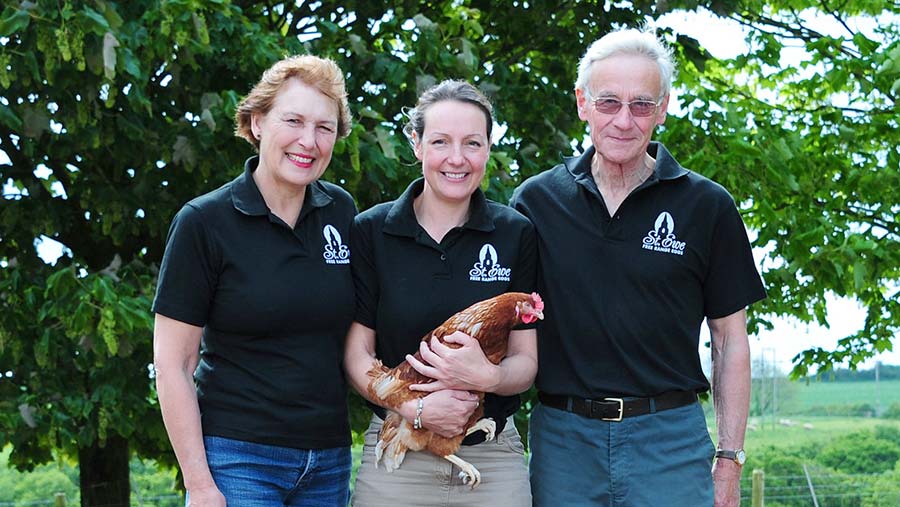From Jersey herd to egg production: One farm’s journey

The Tonks family has been at Ventonwyn Farm for more than 50 years, and three generations have made their living there.
First came dairy, then free-range eggs. More recently the farm has packed eggs for other farmers and has now begun a processing business.
The Tonks’ free-range egg business, east of Truro, is a thriving example of how to make the most of a small family farm.
See also: How to prevent heat stress in egg production
From a modest pedigree Jersey herd to free-range egg production and, more recently, an innovative processing operation, the business has adapted with the times during the five decades that the Tonks family have been its stewards.
Today third-generation Rebecca heads the operation. A crucial part of the farm’s recent successes, she says, is support from the generation that came before.
Farm facts
- Ventonwyn (the name of the farm) means pure spring in Cornish. The farm is named after an 16th century holy well that produces around 22,000 litres of water a day
- 23ha farm, bought by Captain Robin Tonks in 1967
- Dairy first, then free-range poultry, then egg-packing, then egg-processing
How did you get into farming?
My father started a pedigree Jersey herd with his first heifer, Sylvia, and built it up to 70 cows.
I came along in 1976 and ended up in the pram through most milking sessions. By the age of 12, I was milking the cows.
When milk quotas came into force in the early 1980s, it was time to look at another source of income; we decided on free-range chickens.
We adapted an existing barn into a flat-deck free-range house for 1,500 hens. It actually made a profit, and from then on it was feathered friends all the way.
By 2005 we had four flat-deck free-range units that housed 13,000 birds, and before we developed the shed housing the processing plant it was used to rear pullets.
Rachel’s family facts
- Grandpa purchased the farm in 1967 while he was a lecturer in Navy history at Dartmouth Naval College, my father and granny set about renovating the farmhouse and starting a dairy herd.
- Granny and Aunt Rachel’s passion is horses and racing, so there were one or two horses around as well.
- Aunt Rachel pursued her love of racing and became the first female steward for the Jockey Club.
- My mother trained at Bicton Agricultural college and came to work on the farm, and the rest is history.
What’s the most profound change you’ve seen in your generation?
The most significant change to the family and farm was selling the dairy herd in 2002. The farm seemed so quiet, and the delicate manure pong was gone. It took a long time to get used to that.
And the egg-packing side of the business has changed the shape (quite literally) of how we run the farm.
In recent years this change has been compounded by the installation of the egg pasteuriser which we are still getting to grips with, and will be for several years to come, I expect.
What’s been the biggest challenge you’ve had to overcome?
There always seems to be a challenge to overcome, and each new direction we go in there is another tranche of problems but, overall, we have been very fortunate on the whole.
The Tonks Family today
Dad Richard Tonks
Age 69
Number of years farming 53
Mum Christine Tonks
Age 69
Number of years farming 45
Daughter Rebecca Tonks
Age 45
Number of years farming Born into it!
Milestones
2002
Jersey herd dispersed
2007
Egg packing business launched, and own-brand St Ewe Free Range Eggs launched
2017
Egg processing plant installed
Is Brexit a good thing for farming?
I think Brexit poses opportunities and risks for farmers. Whatever happens, there will be change and we need to be able to adapt to it and not be afraid.
UK farmers are damn good and deliver the highest quality produce to the best welfare standards in the world. Be proud!
What has been the key piece of farming kit for your generation?
Our egg graders and pasteuriser are the most technical bits of kit we have on the farm. That said, they are far from new, and we are looking forward to upgrading our packing facilities very soon.
Biggest technology advancement of your generation?
The internet. Without communication, we could not grow.
Most memorable purchase?
I think it would have to be our David Brown tractor. That thing lasted for decades; it actually started gaining value on our insurance cover!
What’s the most valuable thing you’ve learned from the generation before you?
You never stop learning – always have a go at fixing things yourself first.
…and the generation after?
Attention to detail and look at the bigger picture, talk to people, get ideas and trial them.
How have you dealt with succession?
My parents have been very sensible and approached succession with gusto. I don’t think Grandpa’s approach was quite the same, so my father has learned from his experience and had a very proactive approach to the succession of the farm and business.
It’s my turn next, and to be honest, it frightens me to even think about it.
What advice would you give to other families about working together?
I have been very lucky in that my father has a very proactive way of doing things. He is a tremendous support and a font of knowledge, so for this to be shared and trust to be built, you need to communicate and share your feelings and thoughts.
When was the best time for farming?
We are very lucky to be farming; life is what you make it. If you want to enjoy it put in the effort, think sideways, challenge yourself, think outside the box. We are all human and will always need food.
